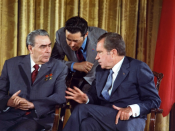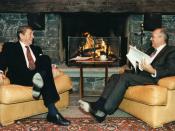The United States of America currently stands alone in a unique position upon the world stage. After nearly fifty years as the anchor upon one side of a bipolar system, the U.S. now finds itself as the only remaining superpower. The Cold War mentality of the 20th century has persisted in the application of American foreign policy, manifesting itself in a dramatic preponderance of power, both political and military, and a willingness to use it. Enjoying a comparative advantage in both nuclear and conventional military power, the United States has gotten used to exerting its will largely unchecked by the objections of other states. Acting as the hegemon, the United States has pursued whatever policies and actions deemed advantageous to the state without having to concern itself with the serious opposition from other players.
But nature abhors a vacuum and the realist conception of international security politics abhors a hegemon.
Historically, unipolar moments have been few, short-lived, and far between. The unquestioned imperial powers of Rome, the Ottoman Empire, and Great Britain all enjoyed their time in the sun but eventually found themselves fading from the center stage, or at least having to make room upon it for new actors. The steady state equilibrium of the realist perspective finds a comfortable middle ground at the multipolar balance of power. Stability comes with a balance of power where actors must take into account the reaction of other actors. The balance of power creates stability by creating uncertainty among the states. Uncertainty breeds caution on the part of decision makers. Caution means following tried and true policies of the past, avoiding deviations. This avoidance of deviation means that, in the words of Hans Morgenthau, "the balance of power and policies aiming at its preservation are not only inevitable, but are an...



WOW
very informative and well written!
gives good information, but not overloaded!!
3 out of 3 people found this comment useful.